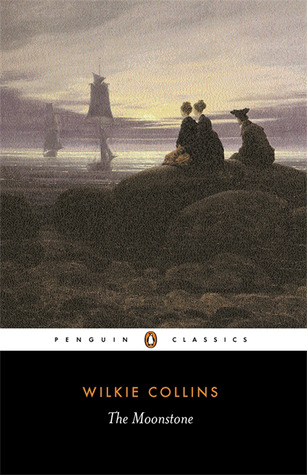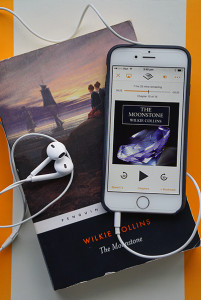The Alienist, Part Three, Chapter 31
Kreizler had engaged a first-class compartment, and after we’d settled into it I immediately stretched out on one seat with my face toward the small window, determined to strangle any curiosity I had about the behaviour of my friends with sleep. For his part, Laszlo pulled out a copy of Wilkie Collins’s The Moonstone that Lucius Isaacson had lent him and began very contentedly reading.
Although nearly two years has passed since the book blog feature was established on 17th Street, it is only now that I am finally overviewing the sole novel included by name in The Alienist. Described by T. S. Eliot as “the first, the longest, and the best of modern English detective novels,” and by Dorothy L. Sayers as “possibly the very finest detective story ever written,” Wilkie Collins’s The Moonstone also served as inspiration for Caleb Carr in the creation of the Alienist series. So, for our final book blog of 2015, let us take a journey back to Victorian England in search of the lost Indian Diamond known to history as The Moonstone.
What’s it about?
The Moonstone, First Period, Chapter 10
‘If you ever go to India, Miss Verinder, don’t take your uncle’s birthday gift with you … I know a certain city, and a certain temple in that city, where, dressed as you are now, your life would not be worth five minutes’ purchase.’
The year is 1848, and the spirited Miss Rachel Verinder is celebrating her eighteenth birthday in the company of family and friends at a house party on her family’s estate in Yorkshire. On this festive day, Miss Verinder is given an unexpected birthday gift that will change her life when it is stolen from her private chambers less than 24 hours after she receives it. The gift is the famous Yellow Diamond, reputed to be cursed, that was looted half a century earlier during the storming of Seringapatam. In a tale that will take you from the ‘shivering sands’ of the Yorkshire coast to London’s bustling streets, Wilkie Collins’s 1868 bestseller introduced an eager public to the idiosyncratic Sergeant Cuff—forerunner of Sherlock Holmes—whose powers of detection are stretched to the limit by three mysterious Indian Brahmin who will let nothing stand in their way to reclaim the lost Diamond, and a household in which nobody is above suspicion.
My thoughts
To explain why it has taken me so long to feature The Moonstone on 17th Street given its significance to the Alienist books, it might be best if I provide a little background before I begin. I first read The Moonstone 10 to 15 years ago, shortly after finishing Wilkie Collins’s first bestseller, The Woman in White. Having loved The Woman in White, I dived into The Moonstone expecting more of the same. Unfortunately, this approach left me somewhat disappointed.
Although it shares the same multiple-narration structure as its forerunner, I found The Moonstone—an early example of the detective novel—more methodological, slower paced, and lacking the psychological intrigue that had drawn me into The Woman in White. That is not to say that I disliked the novel, but where I might have given The Woman in White 5-stars, I probably would have given The Moonstone 3.5 or 4-stars. Thus, faced with the prospect of writing a book blog on The Moonstone for 17th Street, I found myself putting it off for as long as I reasonably could. One reading, I thought at the time, was enough.
However, as the months—nay, years—passed, and I felt that I could not put this off any longer, I decided to try re-reading The Moonstone as an audiobook (narrated by Peter Jeffrey)—and boy, am I glad that I did! Whether I went into the re-read with the right expectations and frame of mind this time (after all, I do enjoy a good detective novel), or whether I simply found a format that suited me better for this particular story, I can say with complete honesty that I loved this re-read, so much so that The Moonstone has become one of my favourite books of 2015, and is a solid 5-star read. Now I finally understand what the Isaacson brothers were on about all this time!
| Continue reading →


